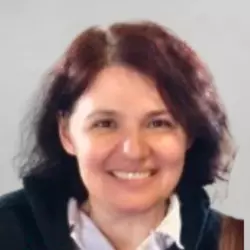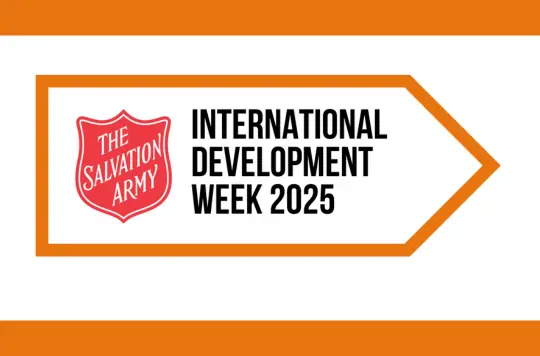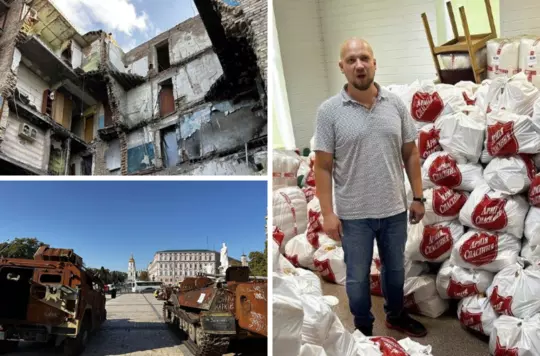19 October 2023
‘I am strong in the Lord’: The life of an emergency services co-ordinator
Major Galina Korenivska

Major Galina Korenivska (Eastern Europe Territory) gives an insight into her work as a territorial emergency services co-ordinator.
How and when did you come into the role?
When the war in Ukraine began in February 2022, it was necessary to immediately respond to the needs of people. Questions arose: What can we do? How can we help? The territorial leadership asked me to take responsibility for co-ordinating assistance for refugees, and that’s how it all began. In November 2022, I received my official appointment. I have now been living and working in five countries for 20 months.
What are your day-to-day duties in the role?
Currently, my work is connected with the war in Ukraine and involves providing assistance and support to refugees and displaced people within the five countries that are part of the Eastern Europe Territory – Bulgaria, Georgia, Moldova, Romania and Ukraine.
My days are different from just sitting in an office at a computer. Every day brings new plans and opportunities, as well as challenges. Today I might write reports, respond to letters and participate in meetings, but tomorrow I might take a plane to Georgia or Bulgaria, travel by car or train to Ukraine, stand at border and customs checkpoints, distribute food vouchers at Romexpo in Bucharest, provide humanitarian aid in Gostomel or sit in a bomb shelter in Kyiv without electricity or communications. I remind myself every day that I am strong in the Lord and that the greatness of his power is immeasurable in me.
What part of your work do you find most challenging?
Twelve days after the start of the war, my husband went to the front to defend his country. He is still there. The most difficult thing is to ‘accept’ news from Ukraine, as well as the uncertainty of when the war will end and peace will come. Also challenging is listening to the experiences of refugees and displaced people, who have lost relatives and friends, as well as their homes in villages and cities that have been completely destroyed. As I travel throughout the territory, everyone I meet has great faith and hope in God. This gives me strength.
What is the most rewarding aspect of your work?
A few weeks ago, I was in Bulgaria, where The Salvation Army is helping refugees from Ukraine. At one of the programmes, I met a woman who initially received assistance from the Army in Romania. She now lives in Bulgaria and attends Salvation Army programmes with her children.
Many refugees not only come to receive help, but also to become volunteers and help their compatriots in corps throughout the territory. The most pleasant thing is seeing the happy faces of children and hearing words of gratitude for the small but necessary help we provide. It is precisely in such moments that the slogan ‘heart to God, hand to man’ most reflects what I am called to do as an officer.
Do you witness God in action in your work?
God’s work is very visible in my daily work, and I rely on him every day. I could not overcome everything on my own, but I know that I can overcome everything by trusting in God. My husband and I still receive daily messages and prayers from our friends all over the world, and we feel God’s presence.
What are the benefits of an international Salvation Army in terms of emergency response?
In 2022 our territory was faced with such a large-scale emergency for the first time. From the very first days of the war in Ukraine, we assisted refugees with immediate needs who crossed the borders into Moldova, Georgia and Romania. We also received support from the Army’s International Emergency Services, and we continue to receive that help. The most important thing is the help and support from Salvationists all over the world, which has included financial assistance and resources.
To what extent do you work with other organisations?
Of course, the closest collaboration is with other Salvation Army territories. Our territory includes five countries, and each country has its own connections with non-governmental organisations. For example, Romania and Moldova maintain close relationships with the United Nations High Commissioner for Refugees. Georgia works with the Ukrainian diaspora and Bulgaria co-operates with Caritas Internationalis and the Red Cross.
Written by

Major Galina Korenivska
Territorial Emergency Services Co-ordinator, Eastern Europe Territory
Discover more

This year you're invited to join with us on a devotional journey based on the Sermon on the Mount and reflect on current global issues.

Captain Richard Bradbury (IHQ) writes about faith in difficult circumstances.

We mark International Development Week in Sunday Worship with a Bible message from Violet Ruria.

Find out how you can stand in solidarity with survivors this Anti-Slavery Day (18 October) and beyond.